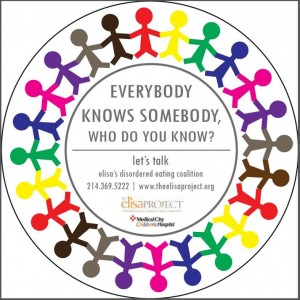By Devin Simkins/reporter

Millions of men and women suffer from an eating disorder at some point in their lives, the advocacy coordinator of The Elisa Project said last week.
Jordan Irvin talked to SE Campus students Feb. 12 about a healthy body image and the importance of spreading the word.
“Eating disorders have the highest mortality rate out of all mental illnesses,” she said. “Food is used to compensate other feelings.”
A nonprofit organization out of Dallas with goals of changing lives, The Elisa Project originated because of one young woman who took her own life after battling these same illnesses and wanted others to never feel what she felt.
“A common way people end eating disorders is by taking their life,” Irvin said. “Elisa wrote in her journal that she didn’t want anyone else to go through this.”
Eating disorders can consist of constantly eating for emotional reasons and eating until overly full or not enough, Irvin said. The three main disorders are anorexia nervosa, bulimia nervosa and binge eating disorder. Some of those who suffer from these disorders get rid of their food after eating by regurgitation, laxatives or too much exercise.
“Causes of extreme versions of eating disorders come from genetics, body dissatisfaction, high-risk environmental influences, traumatic experiences and depression,” she said.
Society plays a negative role in body image, Irvin said. Young children compare themselves to Disney Channel actors while adults of all ages want to look like the people on covers of magazines. People should just focus on and listen to their own bodies. Instead of dieting, Irvin said people should listen to the hunger and fullness cues.
“Mindfulness eating makes food more enjoyable and makes it much easier to know how, when and what to eat to be happier, healthier and satisfied through our whole lives,” she said.
Irvin provided signs for students to look for. Frequent trips to the bathroom, odd eating behaviors, secret eating and discussions about feeling fat even while losing weight are a few signs.
Irvin said she is currently trying to spread the awareness and get the conversation about healthy body image started.
“I am happy to be here and pleased with the turnout,” Irvin said. “I was also happy to see a male in the audience because males need to hear this information too.”
An awareness campaign throughout February is pairing up with National Eating Disorders Awareness Week to bring attention to this issue. For more information, visit www.theelisaproject.org.
























